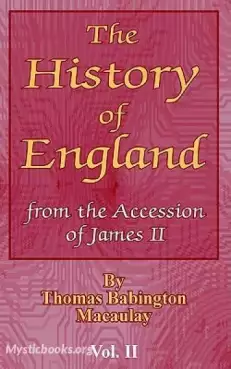
History of England from the Invasion of Julius Caesar to the Revolution of 1688, Volume 1B
by David Hume
'History of England from the Invasion of Julius Caesar to the Revolution of 1688, Volume 1B' Summary
He wrote of the Revolution: "By deciding many important questions in favour of liberty, and still more, by that great precedent of deposing one king, and establishing a new family, it gave such an ascendent to popular principles, as has put the nature of the English Constitution beyond all controversy". Thus Hume is at odds with those who argue that the British Constitution is entirely evolutionary, and did not emerge from a revolution, just like the later American and French Constitutions, and the earlier Dutch Constitution.
The source of this antinomian interpretation of British freedom can be traced in Hume's account of the revolutionary debates themselves. William of Orange had been invited to invade by a coalition of English Whigs and Tories. To placate the latter's maxim that "the throne was never vacant", or in modern parlance the monarch never dies, the fiction was agreed that King James would be said to have abdicated. It fell to the Scottish Parliamentary Convention, meeting a month after the English one: "in a bold and decisive vote", to declare "that king James, by his maladministration, and his abuse of power, had forfeited all title to the crown". Hume wanted to present the UK as having a modern constitution. He did not see it as something that stretched back seamlessly to Magna Carta or the laws of King Alfred.
The narrative ends with a parliamentary convention annexing to the settlement "a declaration of rights, where all the points, which had, of late years, been disputed between king and people, were finally determined; and the powers of the royal prerogative were more narrowly circumscribed and more exactly defined, than in any former period of the English government". In fact Britain has two declarations of right from this period. The Bill of Rights is (or was) the basic law of England, the Claim of Right that for Scotland.
There are important differences between these little studied declarations. Where the Bill of Rights states that the King cannot make laws without the consent of Parliament, the Claim of Right says that all assertions of a right to rule above the law are themselves against the law. The Bill of Rights was inspired by John Locke. Behind the Claim of Right can be detected the guiding hand of James Dalrymple, 1st Viscount of Stair 1619–1695. Hume studied law as a student at Edinburgh. He implies that he neglected this study. This must be taken with a pinch of salt. He may have wanted to avoid giving the lay reader the impression that he had written a history just for lawyers like William Blackstone. What is certain is that he names two of the founders of Roman Dutch law, Johannes Voet and Arnold Vinnius, in the same breath as Cicero and Virgil. Cicero was, of course, a lawyer. The standard work for a Scottish law student to study was, then as now, "Stair's Institutions of the laws of Scotland".
Hume names neither of the unamended constitutions of 1689. He wanted a new constitution for the United Kingdom to flesh out these outline declarations. He set out his proposals in the essay Idea of a Perfect Commonwealth, which is a reworking of The Commonwealth of Oceana by the 17th-century Rutland visionary James Harrington. Leaving the extent of the Commonwealth and the location of its capital undecided, Hume's highly devolved scheme was "to have all the advantages both of a great and a little Commonwealth". In some ways it resembles the model of Presbyterian church government. Hume was no theorist of an unwritten constitution.
Book Details
Authors

David Hume
Scotland
David Hume was a Scottish Enlightenment philosopher, historian, economist, librarian and essayist, who is best known today for his highly influential system of philosophical empiricism, scepticism, an...
Books by David HumeDownload eBooks
Listen/Download Audiobook
- Select Speed
Related books

American Crisis aka "The Crisis" by Thomas Paine
A collection of pamphlets written by Thomas Paine during the American Revolution, providing a compelling argument for independence and urging the colo...

Cambridge Modern History, Volume 01, The Renaissance by Various
The first volume of *The Cambridge Modern History* focuses on the Renaissance, a pivotal period in European history characterized by a renewed interes...

The History of England, from the Accession of James II - (Volume 2, Chapter 09) by Thomas Babington Macaulay
The History of England from the Accession of James the Second (1848) is the full title of the five-volume work by Lord Macaulay (1800–1859) more gener...

State of the Union Addresses by United States Presidents (1845 - 1848) by James K. Polk
This album contains recordings of State of the Union addresses delivered by President James K. Polk during his term from 1845 to 1848. These speeches...

Queen Elizabeth by Mandell Creighton
This biography by historian Mandell Creighton explores the life and reign of Queen Elizabeth I of England. It details the turbulent period of her asce...

Negro Problem by Various
This collection of essays, edited by Booker T. Washington, is representative of what historians have characterized as "racial uplift ideology." These...

National Geographic Magazine Vol. 09 - 01. January 1898 by National Geographic Society
This volume of the National Geographic Magazine presents a diverse range of articles on various topics related to geography, natural resources, and cu...

State of the Union Addresses by United States Presidents (1889 - 1892) by Benjamin Harrison
This book contains the transcripts of President Benjamin Harrison's annual State of the Union addresses delivered between 1889 and 1892. These address...

Montes de Oca by Benito Pérez Galdós
Montes de Oca is the eighth novel in the third series of Benito Pérez Galdós' Episodios Nacionales. It takes place in Madrid during the regency of Mar...

Ιστορίαι (Histories) Βιβλίον 6 (Book 6) by Thucydides
Thucydides' Histories is a seminal work of historical scholarship and a cornerstone of Western literature. Written in the 5th century B.C., it chronic...
Reviews for History of England from the Invasion of Julius Caesar to the Revolution of 1688, Volume 1B
No reviews posted or approved, yet...